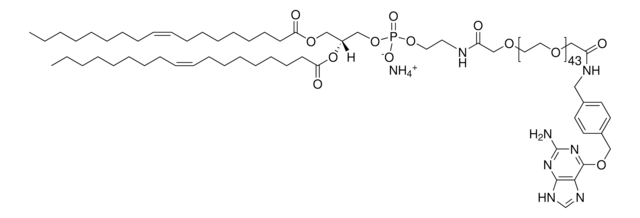890705C
Avanti
16:0-18:1 EPC (Cl Salt)
Avanti Research™ - A Croda Brand 890705C
Synonyme(s) :
1-palmitoyl-2-oleoyl-sn-glycero-3-ethylphosphocholine (chloride salt)
About This Item
Produits recommandés
Forme
liquid
Conditionnement
pkg of 1 × 1 mL (890705C-10mg)
pkg of 1 × 2.5 mL (890705C-25mg)
Fabricant/nom de marque
Avanti Research™ - A Croda Brand 890705C
Concentration
10 mg/mL (890705C-10mg)
10 mg/mL (890705C-25mg)
Type de lipide
transfection
cationic lipids
Conditions d'expédition
dry ice
Température de stockage
−20°C
Chaîne SMILES
O=P(OCC[N+](C)(C)C)(OC[C@]([H])(OC(CCCCCCC/C=C\CCCCCCCC)=O)COC(CCCCCCCCCCCCCCC)=O)OCC.[Cl-]
Description générale
Application
- as a cationic lipid to explore the change in organization and dynamics of a membrane-bound fluorescent probe in host membranes of varying charge
- in the preparation of small unilamellar cationic liposomes
- in a novel albumin-associated lipoplex formulation to evaluate the antitumoral efficacy of immuno-gene therapy and “suicide” gene therapy
Actions biochimiques/physiologiques
Conditionnement
Informations légales
Mention d'avertissement
Danger
Mentions de danger
Classification des risques
Acute Tox. 3 Inhalation - Acute Tox. 4 Oral - Aquatic Chronic 3 - Carc. 2 - Eye Irrit. 2 - Repr. 2 - Skin Irrit. 2 - STOT RE 1 - STOT SE 3
Organes cibles
Central nervous system, Liver,Kidney
Classe de danger pour l'eau (WGK)
WGK 3
Certificats d'analyse (COA)
Recherchez un Certificats d'analyse (COA) en saisissant le numéro de lot du produit. Les numéros de lot figurent sur l'étiquette du produit après les mots "Lot" ou "Batch".
Déjà en possession de ce produit ?
Retrouvez la documentation relative aux produits que vous avez récemment achetés dans la Bibliothèque de documents.
Notre équipe de scientifiques dispose d'une expérience dans tous les secteurs de la recherche, notamment en sciences de la vie, science des matériaux, synthèse chimique, chromatographie, analyse et dans de nombreux autres domaines..
Contacter notre Service technique










